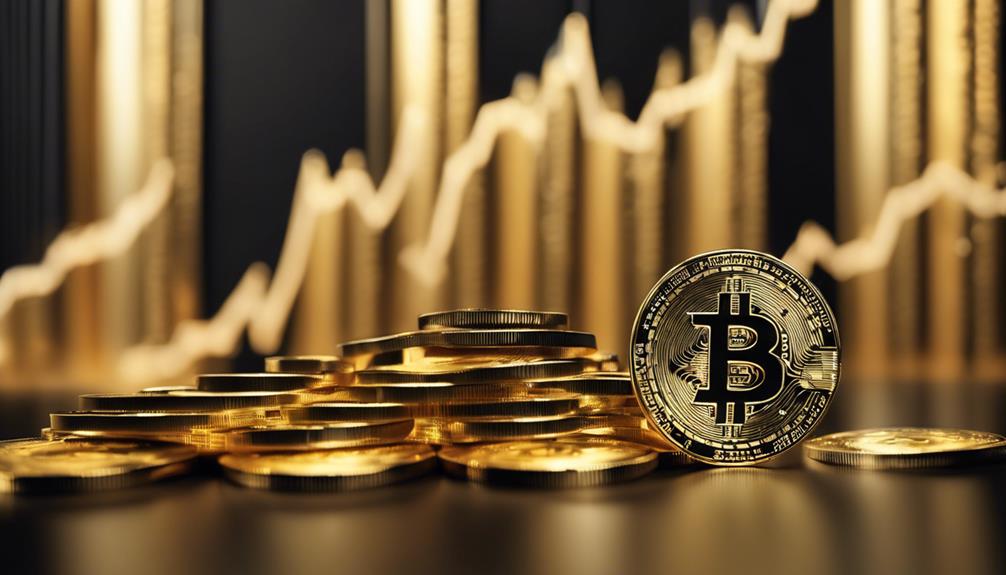Bitcoin’s market cap approaches $1.4 trillion, which is a fraction of gold’s $14 trillion. The digital currency represents around 10% of gold’s market cap. Despite Bitcoin surpassing gold in adoption, gold still holds a dominant position globally. Institutional interest in Bitcoin is significant and affects asset allocation strategies. The volatility of Bitcoin, which is 3.7 times higher than gold, presents investment challenges. Bitcoin is emerging as a digital store of value, challenging traditional perceptions. Referred to as “digital gold,” Bitcoin is reshaping investment trends. To gain more insights into Bitcoin’s evolving position compared to gold, delve deeper into its adoption rates, network growth, and ETF performances in investment portfolios.
Key Takeaways
- Bitcoin's market cap is $1.4 trillion, around 10% of gold's $14 trillion.
- Bitcoin's adoption rate exceeds gold, with high institutional interest.
- Bitcoin's network growth surpasses gold, impacting the Bitcoin-to-gold ratio.
- Bitcoin's volatility is 3.7 times higher than gold, influencing investments.
- Bitcoin's evolution as a digital asset challenges traditional perceptions of gold.
Market Cap Trends: Bitcoin Vs. Gold

Comparing the market cap trends between Bitcoin and gold reveals distinctive disparities in the valuation and global recognition of these two prominent assets. Currently, Bitcoin boasts a market cap of approximately $1.4 trillion, whereas gold's market cap towers at $14 trillion, making gold the dominant global asset in terms of market capitalization. Despite Bitcoin's recent growth, its market cap still only represents around 10% of gold's market cap, indicating a significant gap between the two assets.
In the domain of Exchange-Traded Funds (ETFs), gold has traditionally held a strong position, with numerous gold-backed ETFs allowing investors to gain exposure to the precious metal. On the other hand, Bitcoin ETFs are a relatively new development, showing the growing interest in incorporating cryptocurrencies into traditional investment vehicles.
While Bitcoin exhibits robust market liquidity and trading volume, signaling increasing investor interest, gold maintains its status as the largest global asset. The disparity in market caps between Bitcoin and gold highlights the differing levels of recognition and valuation these assets currently command in the investment world.
Adoption Rates Comparison

The surge in adoption rates between Bitcoin and gold underscores a changing landscape within the realm of investment preferences and financial instruments. Bitcoin's adoption rate has surpassed that of gold, driven by factors such as the ease of investment and liquidity it offers. Institutional adoption of Bitcoin is evident through the significant assets under management in Bitcoin ETFs, highlighting a shift in investor portfolio allocation towards digital assets. Comparatively, gold ETFs have experienced outflows while Bitcoin ETFs continue to attract substantial investments, indicating a preference for Bitcoin over gold in the current market. The expanding Bitcoin ETF market size further solidifies its position as a favored investment choice, potentially surpassing gold regarding overall adoption rates. This trend showcases a growing acceptance of digital currencies among traditional investors and emphasizes the importance of staying informed about evolving investment opportunities.
| Bitcoin | Gold | |
|---|---|---|
| Wallets | Growing | Stable |
| Transactions | Increasing | Limited |
| Users | Rising | Established |
| Institutional Adoption | High | Moderate |
| Investor Preference | Increasing | Declining |
Bitcoin-to-Gold Ratio Analysis

Analysis of the Bitcoin-to-Gold ratio reveals the relative valuation dynamics between these two prominent assets in the current financial landscape. Understanding this ratio is vital for investors looking to diversify their portfolios effectively. Here are four key points to ponder:
- Market Capitalization Disparity: Bitcoin's market cap of $1.4 trillion pales in comparison to gold's $14 trillion, indicating the vast difference in scale between the two assets.
- Allocation Considerations: The current Bitcoin-to-gold ratio stands at 1 Bitcoin to 33 ounces of gold, signaling the relative value proposition of Bitcoin compared to gold for portfolio diversification.
- ETF Impact: Institutional interest in Bitcoin, exemplified by the rise of Bitcoin ETFs, has influenced the Bitcoin-to-gold ratio in favor of Bitcoin, highlighting the shifting preferences in investor portfolios.
- Scarcity and Value Proposition: Bitcoin's fixed supply cap of 21 million coins, as opposed to gold's ongoing mining supply, adds to its scarcity and value proposition, impacting its relative valuation against gold.
Take these factors into account when evaluating the Bitcoin-to-Gold ratio for informed investment decisions.
Institutional Investment Impact

Amidst the evolving landscape of investment strategies, the increasing influx of institutional interest in Bitcoin is reshaping traditional perceptions of asset allocation. Institutional investors are recognizing Bitcoin as a potential store of value, with its narrative as 'digital gold' gaining traction.
However, concerns over Bitcoin's price volatility continue to impact institutional investment decisions. The comparison between Bitcoin and gold in institutional portfolios highlights a shift towards digital assets in investment strategies.
As institutional investors navigate the Bitcoin ETF market, the debate over whether Bitcoin can surpass gold intensifies. The potential for Bitcoin to outpace gold is closely tied to the growing institutional interest in the cryptocurrency.
Understanding the role of Bitcoin alongside gold in an investor portfolio is becoming increasingly important as digital assets gain prominence in the investment world. Balancing the benefits of diversification with the challenges posed by volatility remains a key consideration for institutional investors looking to optimize their portfolios.
Network Growth Dynamics

As the narrative of Bitcoin as a potential store of value gains momentum among institutional investors, the discussion now shifts to examining the network growth dynamics of this cryptocurrency compared to traditional assets like gold. When evaluating the network growth dynamics of Bitcoin and gold, several key points emerge:
- Bitcoin's Network Growth: Bitcoin's network growth surpasses that of gold, evidenced by the increasing number of wallets, transactions, and users.
- Adoption Rate: The adoption rate of Bitcoin demonstrates significant network expansion compared to gold, indicating a faster pace of growth.
- Advantages of Bitcoin: Bitcoin offers benefits in terms of liquidity and ease of investment, contributing to its network growth dynamics and appeal to investors.
- Market Size Impact: Factors such as market demand, macroeconomic conditions, and institutional interest in Bitcoin influence the Bitcoin-to-gold ratio, impacting both assets' presence in investor portfolios.
These factors play a vital role in understanding the evolving landscape of cryptocurrency and traditional assets within investor portfolios, especially with the increasing integration of products like ETFs.
Volatility Concerns Addressed

Bitcoin's price stability is essential when comparing it to gold's volatility.
Investors must carefully consider how fluctuations in value can impact their portfolios.
Understanding the differences between these assets can help individuals make informed decisions for their retirement investments.
Bitcoin's Price Stability
Despite Bitcoin's higher volatility compared to gold, its increasing presence in investor portfolios suggests a shifting positive sentiment towards the cryptocurrency's price stability.
- Bitcoin's volatility is approximately 3.7 times higher than gold's, impacting its price stability.
- Adjusting for volatility, Bitcoin already holds a larger place in investor portfolios than gold.
- If Bitcoin's volatility was considered, its value could be limited to around $900 billion compared to its current value of approximately $1.3 trillion.
- Bitcoin's price could be around $45,000 instead of $67,800 if it were perceived like gold.
Comparing Gold Volatility
Comparing the volatility between gold and Bitcoin reveals distinct differences in their price behavior and risk profiles. Bitcoin's volatility is approximately 3.7 times higher than that of gold, indicating a higher level of price fluctuation and risk.
Even when adjusting for volatility, Bitcoin holds a larger presence in investor portfolios compared to gold, highlighting its significance as an investment asset. However, Bitcoin's value could be limited to around $900 billion if its volatility were considered, suggesting that its current price may be influenced by factors beyond its intrinsic value.
If Bitcoin were perceived similarly to gold, its price would be around $45,000 instead of $67,800, emphasizing the impact of volatility on its market value. Therefore, understanding and managing volatility is essential when considering investments in assets like gold and Bitcoin ETFs.
Digital Gold Concept

The comparison between Bitcoin and gold as store of value assets has become a prominent discussion in investment circles. As investors seek alternatives to traditional assets, Bitcoin's evolution as a digital asset is garnering significant attention.
Understanding the investment trends surrounding Bitcoin and gold can provide valuable insights for those considering modernizing their investment portfolios.
Bitcoin Vs Gold
In the domain of investment portfolios, the ongoing debate between Bitcoin and gold revolves around their distinct yet potentially complementary roles as stores of value, with Bitcoin's market dynamics challenging traditional perceptions of gold's supremacy.
- Bitcoin's total value is approximately $1.3 trillion, while gold's value for investment purposes is $3.3 trillion.
- Adjusting for volatility, Bitcoin already has a larger place in investor portfolios than gold, with a 3.7 times higher volatility compared to gold.
- Bitcoin could potentially rise by 153% to match gold's value, highlighting its growth potential.
- If Bitcoin were perceived like gold, its price would be around $45,000 instead of the current $67,800, showcasing its unique market positioning.
Store of Value
Bitcoin's evolution as a modern alternative to traditional store of value assets like gold is underscored by its growing adoption and recognition in investor portfolios, supported by the concept of 'digital gold.' Institutional investors are increasingly viewing Bitcoin as a viable store of value, akin to gold, due to its fixed supply cap and scarcity. The narrative of Bitcoin as digital gold is gaining traction, with its properties mirroring those of precious metals. This shift is evident in the increasing institutional interest and incorporation of Bitcoin into diversified investment portfolios. The concept of store of value is evolving, with Bitcoin playing a significant role in reshaping traditional perceptions of asset value storage.
| Bitcoin | Gold |
|---|---|
| Limited Supply | Limited Supply |
| Digital Asset | Physical Asset |
| Increasing Adoption | Time-tested Asset |
| Technological Innovation | Historical Significance |
| Institutional Interest | Jewelry and Industrial Use |
Investment Trends
Amid the evolving landscape of investment strategies, the concept of digital gold is reshaping how investors perceive and incorporate alternative assets into their portfolios.
- Investor Portfolios: Bitcoin is increasingly being integrated into investor portfolios as a hedge against economic uncertainties.
- Bitcoin ETFs: The introduction of Bitcoin exchange-traded funds (ETFs) is facilitating easier access to digital assets for a broader range of investors.
- Market Dynamics: Shifting market dynamics are reflecting a growing preference for Bitcoin over traditional assets like gold, indicating changing investor behavior.
- Digital Gold: The narrative surrounding Bitcoin as 'digital gold' is gaining momentum, influencing investment trends and prompting a reevaluation of portfolio diversification strategies.
ETF Performance Evaluation
With the substantial net inflow of $9 billion into Bitcoin ETFs since their inception, the evaluation of ETF performance indicates a potential market size of up to $62 billion if gold is used as a benchmark. In February, spot Bitcoin ETFs experienced a significant rise in net sales, reaching $6.1 billion, showcasing strong investor interest.
The recent 33% surge in Bitcoin's value over the past two weeks has also led to substantial inflows into spot Bitcoin ETFs. Moreover, the total cryptocurrency market capitalization skyrocketed by 40% to $2.2 trillion in February, largely driven by the performance of Bitcoin and Ethereum ETFs.
This optimistic period for the cryptocurrency market was fueled by the impressive performance of Bitcoin ETFs, marking a notable trend in the investment landscape. As investors continue to show confidence in Bitcoin ETFs, the market capitalization of these funds could potentially expand further, reflecting a growing preference for digital assets in investment portfolios.
Frequently Asked Questions
Will Bitcoin Surpass Gold?
While the future remains uncertain, Bitcoin's potential to surpass gold is a topic of interest among investors. Factors such as market cap, volatility, and perceived value play pivotal roles.
Bitcoin's current market cap of $1.3 trillion compared to gold's $3.3 trillion valuation showcases room for growth. However, Bitcoin's volatility, being 3.7 times higher than gold's, affects its perceived value in portfolios.
The question of whether Bitcoin will surpass gold is complex and hinges on various market dynamics.
Is Bitcoin More Valuable Than Gold?
Bitcoin's current market value is approximately $1.3 trillion, while gold's stands at $3.3 trillion for investment purposes. Adjusting for volatility, Bitcoin's weight in investor portfolios surpasses gold by 3.7 times, showcasing its significant role.
With a potential 153% growth trajectory to match gold's value, Bitcoin's value could rise substantially. If perceived akin to gold, Bitcoin's price would be around $45,000, contrasting with its current $67,800 valuation. Such a scenario highlights the dynamic nature of the cryptocurrency market and the significant impact that investor perception can have on asset valuation. While some forecasts remain optimistic, others urge caution due to Bitcoin’s inherent volatility. Still, long-term enthusiasts often speculate about Bitcoin value prediction in 10 years, envisioning scenarios where it becomes a mainstream store of value or even surpasses traditional assets like gold.
Did Bitcoin Surpass Gold in Investor Portfolio Allocation Jpmorgan Says?
JPMorgan analysts assert that Bitcoin has surpassed gold in investor portfolio allocation, with a 3.7 times greater allocation when accounting for volatility. This shift is evidenced by a significant net inflow of $9 billion into Bitcoin ETFs since their inception.
Additionally, the potential market size for Bitcoin ETFs could reach $62 billion if leveraging gold as a benchmark. These trends highlight a notable preference for Bitcoin over traditional assets among investors.
Is the Status of Gold Threatened by Bitcoin?
The status of gold faces potential challenges from Bitcoin due to changing investor preferences. Bitcoin's growing prominence in investor portfolios, driven by its higher volatility-adjusted role compared to gold, has raised concerns about gold's enduring status.
As Bitcoin continues to garner attention for its perceived value and utility, gold may encounter increased competition as a traditional store of value. This evolving dynamic underscores the need for investors to carefully assess the role of both assets in their portfolios.
Conclusion
In the ever-evolving landscape of financial markets, the debate between Bitcoin and gold continues to spark interest.
While both assets have their merits, the data suggests that Bitcoin's market cap and adoption rates are on the rise, potentially surpassing gold in the near future.
Institutional investments, network growth dynamics, and the digital gold concept all play a role in this ongoing discussion.
As investors navigate these complex waters, only time will tell which asset will reign supreme.









